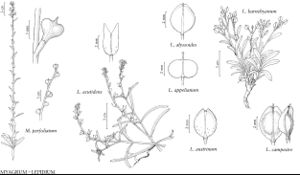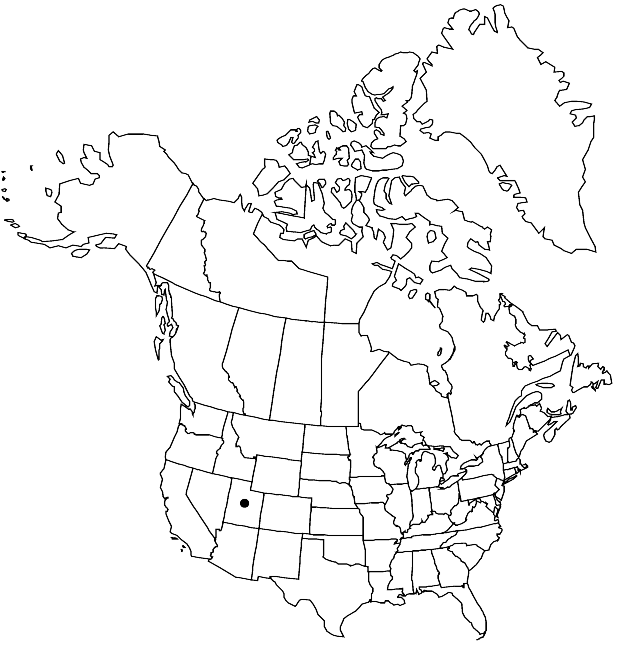Difference between revisions of "Lepidium barnebyanum"
Great Basin Naturalist 27: 178. 1967.
FNA>Volume Importer |
FNA>Volume Importer |
||
| Line 27: | Line 27: | ||
|distribution=Utah. | |distribution=Utah. | ||
|discussion=<p>Of conservation concern.</p><!-- | |discussion=<p>Of conservation concern.</p><!-- | ||
| − | --><p>Lepidium barnebyanum is known from the Green River and Uinta Shale Formations in Duchesne County. It is in the Center for Plant Conservation’s National Collection of Endangered Plants.</p> | + | --><p><i>Lepidium barnebyanum</i> is known from the Green River and Uinta Shale Formations in Duchesne County. It is in the Center for Plant Conservation’s National Collection of Endangered Plants.</p> |
|tables= | |tables= | ||
|references= | |references= | ||
| Line 51: | Line 51: | ||
|publication year=1967 | |publication year=1967 | ||
|special status= | |special status= | ||
| − | |source xml=https://jpend@bitbucket.org/aafc-mbb/fna-data-curation.git/src/ | + | |source xml=https://jpend@bitbucket.org/aafc-mbb/fna-data-curation.git/src/8f726806613d60c220dc4493de13607dd3150896/coarse_grained_fna_xml/V7/V7_927.xml |
|tribe=Brassicaceae tribe Lepidieae | |tribe=Brassicaceae tribe Lepidieae | ||
|genus=Lepidium | |genus=Lepidium | ||
Revision as of 19:00, 18 September 2019
Perennials; (cespitose, caudex thick, woody, numerous-branched, with persistent petiolar remains); puberulent. Stems simple or few from base (caudex), erect to ascending, unbranched or branched distally, (0.3–)0.5–1.5(–1.7) dm. Basal leaves not rosulate; petiole 0.3–0.8 cm, (papery); blade linear, (0.5–)1–7(–8) cm × 10–36 mm, margins entire. Cauline leaves sessile; blade linear, base attenuate, not auriculate, margins entire, (similar to basal, smaller distally). Racemes slightly elongated in fruit; rachis puberulent, trichomes straight. Fruiting pedicels divaricate-ascending, straight, (terete), 3–8 × 0.3–0.4 mm, puberulent throughout. Flowers: sepals (sometimes somewhat persistent), oblong-obovate, 1.8–2.8 × 1.3–1.8 mm; petals white to pale yellow, suborbicular to broadly obovate, 3.2–4.6 × 2.5–3.2 mm, claw 0.5–1.5 mm; stamens 6; filaments 1.8–2.6 mm, (glabrous); anthers 0.5–0.8 mm. Fruits ovate, 4–5.5(–6.2) × 3–3.8 mm, apically winged, apical notch 0–0.2 mm deep; valves thin, smooth, not veined, glabrous; style 0.5–1.2 mm, exserted beyond apical notch. Seeds ovate, 2.2–2.8 × 1.4–1.6 mm.
Phenology: Flowering May–Jun.
Habitat: Pinyon-juniper and sagebrush communities, white sandy shale
Elevation: 1800-2000 m
Discussion
Of conservation concern.
Lepidium barnebyanum is known from the Green River and Uinta Shale Formations in Duchesne County. It is in the Center for Plant Conservation’s National Collection of Endangered Plants.
Selected References
None.

